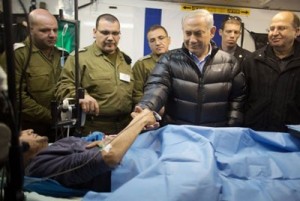Special to WorldTribune.com
AMMAN — Israel has set new guidelines for confrontation with the Iranian-sponsored Hizbullah in Lebanon, a report said.
An influential Jordanian think tank asserted that Israel’s military was increasing involvement in the civil war in Syria while challenging Hizbullah in Lebanon.

The Al Quds Center for Political Studies said this represented a change in Israeli policy in the aftermath of the war with Hizbullah in 2006.
“Anyone reading the most recent chapters of Israel’s political/security discourse would note that Tel Aviv has begun to expand its red lines,” the report, titled “Changing Rules of Engagement,” said.
Al Quds Center director Oraib Al Rantawi said Israel was considering the establishment of what he termed a “proxy mini-state in southern Syria.” Al Rantawi cited the unprecedented visit by Israeli Prime Minister Benjamin Netanyahu to injured Syrian rebels treated in the Jewish state.
“Based on the available information, there is credible talk of Israeli operational coordination, logistical support and occasional arms supplies to the armed Syrian opposition militias in Dera and Quneitra,” the report said.
“And there are confirmed reports of high-level contacts with commanders of
the various opposition warlords and axes in this regard.”
The report cited an Israeli air strike on suspected Hizbullah missile
convoys and sites along the Lebanese-Syrian border on Feb. 24. The
strike was said to have represented Israel’s determination to stop Hizbullah
from controlling the mountains between Lebanon and Syria.
Another scenario was that Israel, amid U.S. inaction, has decided to
secure southern Syria amid the failure of the Sunni revolt. The report also
raised the prospect that Israel would try to disperse Hizbullah units as
Iran sought to maintain nuclear talks with the West.
“Be that as it may, Israel’s direct involvement in the northern
battlefields, whether tactical or strategic, does not mean that the
confrontation has been decided,” the report said. “In fact, this development
may reshuffle all the region’s cards without ensuring that the results of an
Israeli war in 2014 would be any better than the results of the 1982 and
2006 wars, or the two American wars on Iraq and Afghanistan.”

You must be logged in to post a comment Login